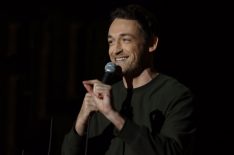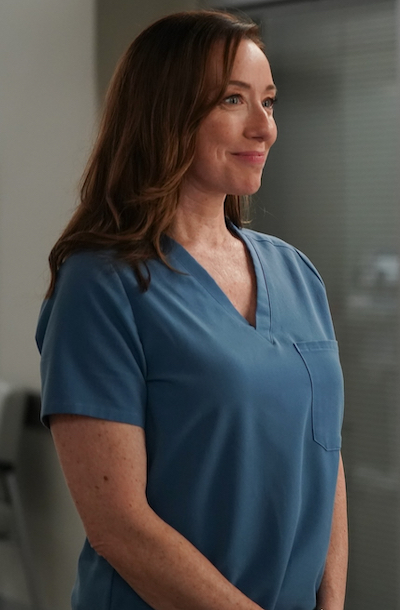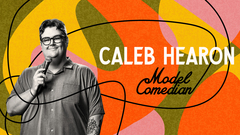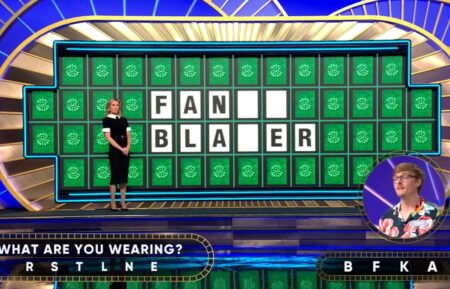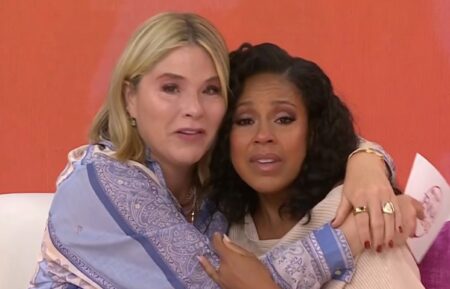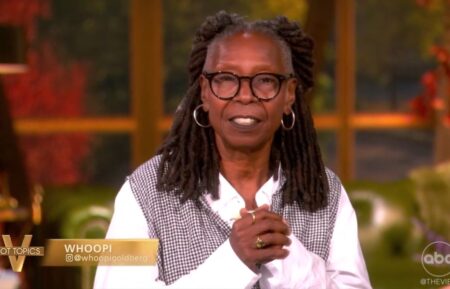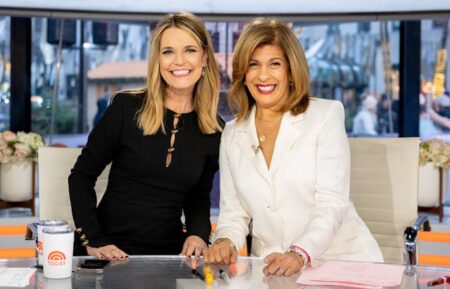‘Model Comedian’: Caleb Hearon on Getting Personal for His First HBO Stand-Up Special

Q&A
Caleb Hearon is putting it all out there in his first HBO stand-up special, Caleb Hearon: Model Comedian, but the comedian, actor, writer, and director isn’t a stranger to opening up as his star continues to catapult with his various pursuits, ranging from his popular podcast So True with Caleb Hearon to his upcoming role in the highly-anticipated Devil Wears Prada sequel.
Originally from Kansas City, Hearon made his way up in the Chicago comedy scene and has appeared across film and television in titles like Prime Video’s recent hit Overcompensating and Jurassic World Dominion. But in his stand-up special, Hearon is keeping things intimate in a small performance setting, opening up about his childhood, his sexuality, the loss of his father, and so much more.
Below, Hearon gets candid with TV Insider about bringing the special to TV and addressing serious topics with his signature comedy voice.
What’s exciting about approaching the stand-up format for an HBO special?
Caleb Hearon: I love stand-up. There’s this funny thing where so many people know me from the internet stuff, and they say, “Oh, he’s branching into stand-up or he’s branching into acting,” which doesn’t bother me at all, but I’m like… well, no, actually I started in improv, stand-up, and acting, and I branched into internet stuff because I was trying to get something going.

Emilio Madrid / HBO
Standing up in a room full of people and conveying an idea that can create emotion for them, whether that be singing or stand-up or whatever, I think it’s always been important, but it feels especially important to me now when everything is AI and all this digital stuff is taking over. The ability to stand up in a room in front of people and just say ideas and entertain, it’s more important than ever, and I just love it. I love crafting words. I love trying to backload a joke and get the funniest consonant and the funniest place. I really love John Mulaney‘s work. I think he’s so meticulous with his words. I’m a little more free-flowing and story-based, but I really respect all of it, and I enjoy the different ways that people approach it.
We have this whole community and culture and this thing that feels very special. What drew me to being an entertainer in general is I was an undergrad studying to be a lawyer, I was really bored, and I was like, I don’t want to do one thing forever, I want to have a kind of life where I can jump from this to that and the other thing. This career has been so good and exciting for me so far because I get to direct a music video one weekend, and then act in a movie, and then be off writing a script, and then stand-up, and then podcasting. I just think all the different ways to connect with people and entertain really excite me.
What was so special about setting the event in Chicago?
HBO has been such a dream to work with. I think sometimes, as artists, we have this default setting of like, “Oh, the company is going to try and beat my thing into something it’s not.” We have this kind of weariness and this combativeness that we can come in with, and I had a real hope that working with HBO would be different, and it was. They’ve been so awesome, and they let me do it my way. I wanted to build a set. I didn’t want to do a theater just to prove that we could do a theater. I wanted to be in a small room. I wanted to be in Chicago because, to your question, that’s where I started up when I finished college, and I had been doing improv and stand-up for a while. It’s where I learned how to write jokes and tell stories and figured out my voice and what I even think is interesting, and it felt obvious to me that it would either be in Kansas City or Chicago, and because Chicago had so many early performance memories for me, that seemed like the one.

Emilio Madrid / HBO
How do you toe the line between addressing darker subject matter, like bullying and death, while maintaining the comedic tone of the special?
First and foremost, across the board, I try to make people laugh. One piece of deciding how you approach heavy content, which is a lot of the special, is, are you too raw to be talking about this? And I’m not. I’ve processed all those things. I know where I stand on them and so, I’m not up there doing therapy, and I think that’s a really important part to me of the way that I approach stand-up.
I think that’s one part, and then the other part is you’ve got to build credibility. There’s a big, long bit at the end of the special, that I’ll let people go and find out what it’s about, but I think you have to put that bit in that place because ideally you’ve spent the rest of the hour leading up to that building credibility to let people know, “Hey, this is the kind of person I am, these are my values, and this is why it’s OK that I’m joking like this about this stuff.”
I don’t really believe in punching up or punching down as a rubric. I think there are some people without power who deserve to be made fun of, and I think there are some people with power who deserve grace. I think the rubric is way more, are you doing the right thing? Are you saying something that is ultimately kind and correct and based on what is true to you? And I think that’s how I tackle more serious stuff. But the fat kid bit just really came from a place of me thinking about how crazy it was that growing up, adults would just acknowledge that you were going to get picked on. It just didn’t feel powerful enough. I think I wanted someone when I was a kid, to say, “No, f**k those people, you’re good.”
You open up about your father in the special. What did it mean to honor him in that way by joking about the grief you experienced over his loss?
We all deal with this at some point, and if it’s not us dealing with our parents’ death, it’s our parents dealing with our death. It’s like, at some point, we all have to deal with this thing, and my family, we just laugh at everything. I know that when I die, my family is gonna be cracking jokes within an hour, and that brings me a lot of peace, actually. I come from a very funny, dark, sardonic kind of family, and we laugh about everything.
So, crafting that material felt like — my dad was an extremely funny guy. It did feel like an incredible way to honor him and our relationship, and also hopefully, if I’m doing anything, I’m just trying to connect. All I want to do with my time on Earth is connect. I want to feel seen, and I want you to feel seen, and I want to just spend this time that I have here trying to connect and make this whole thing more worthwhile. Part of getting up on stage and talking about yourself can be a little masturbatory; it can be about you, but in a bigger way, I hope that it’s about us and that it’s about you also feeling seen by the stuff that I’m going through.
How did you land on Model Comedian for the title?
I got to choose that, and [HBO] was cool with it; they didn’t have any notes on that. One thing about choosing the title process-wise is that you know, in the bit, it’s “comedian not a model” and I thought about calling it “comedian not a model,” but then I was like, I don’t feel that way actually. I don’t even want to accidentally traffic in self-debasing humor about me being ugly because I don’t think I’m ugly, I think I’m really, really hot, and I think I’m hyper conscious sometimes as a fat person with a public image that I don’t even accidentally play into that, and so Model Comedian felt way more like me, and I’m really happy with that.
Caleb Hearon: Model Comedian, Friday, September 19, 9/8c, HBO and HBO Max
From TV Guide Magazine
Inside 'Doc' Season 2 With Molly Parker: New Faces, Medical Mysteries & Love Triangles
“She’s on the one hand solving mystery medical cases during the day at work, but also a detective in her own life,” Parker teases. Read the story now on TV Insider.

